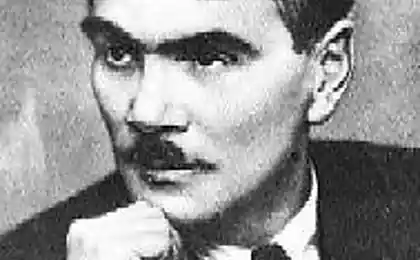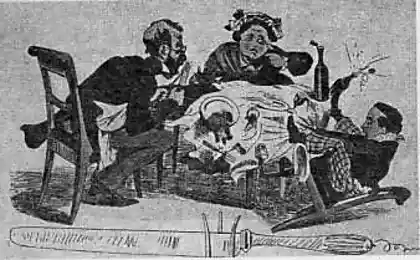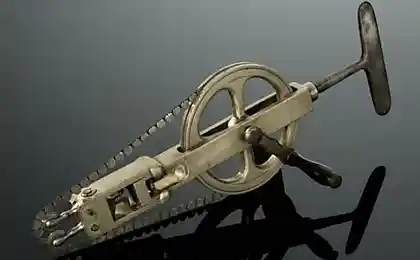512
What could the boy in the Russian countryside a century ago
At 6-7 years of age the child appeared stable household duties, while labour has gained a sexual division: the boy shifted in his father's field of labor, he was attracted to the male class, the girl to female. For example, in Simbirsk province in the 6 years the boys were instructed to carry at the time of threshing the sheaves, 8 — herd of horses in the 9-10 — harrow, 12 — plow, and in the 16-17 — mowing.
Attracting boys to work on the ground was one of the most important points in the transfer of skills necessary for independent living. Not owning them, the teenager could not become a full member of the village community. In the Russian tradition, the practice of farming was perceived as the Foundation of full male status.
Becoming the assistant of his father, the boy participated in all its works. In the manuring of land: dad brought manure and scattered it in large piles, the son dragged him across the field, and then during plowing saw to it that clods of earth and manure do not impede the work of the plow and not covered furrow.
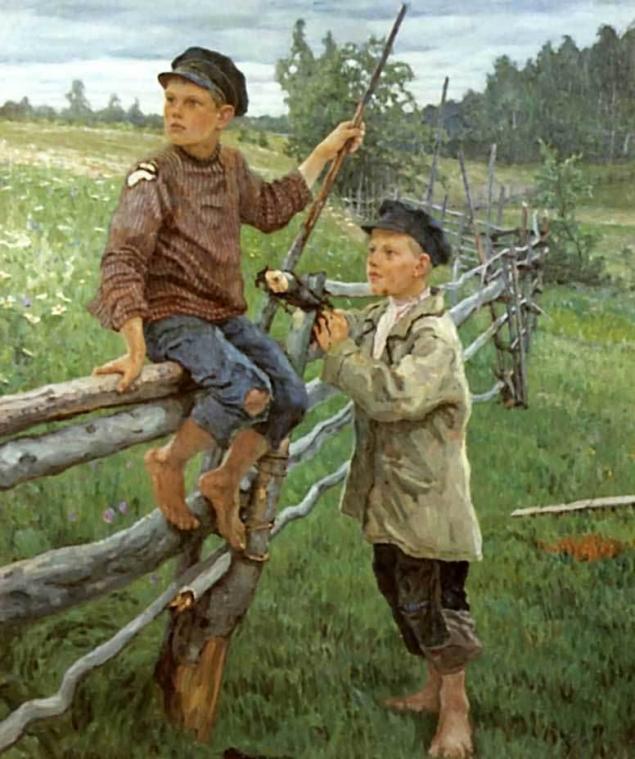
From 11-13 years, the father taught the boy for ploughing. "Nedoluha" he rarely explained to the son how to plow, and it was not necessary, because he, following his father relentlessly, adopting all the necessary techniques. Father trusted his son to spend a couple of furrows or allowed to exercise with independent processing of the small area of arable land. The teenager mastered plowing usually 14-15 years — on the threshold of adulthood.
In the Russian village of the XIX — XX V. V. the accession of the boy labour in family life, the mastery of men's economic functions was accompanied onnecessary by bringing him to the care of the horses: and he asked them food, gave to drink in the summer drove to the river to drink. 5-6 years old child was trained to control the horse, sitting on horseback. 8-9 years, the boy learned to harness a horse, to manage it, sitting and standing in the cart. At this age he was sent to night — night summer grazing of the herds of the village horses.
In the Russian North and in Siberia, where fisheries (fishing, hunting, etc.) had in the circle of the economic concerns of vital importance, children with early childhood attracted to commercial pursuits.
First, in the game, and then watching his father and brothers, helping them to measure the forces, 8-9 years boy took over the basics of the fishery: was able to put in the middle lake loop on the ducks to shoot from a bow. In 10 years teenagers caught gophers, coring. Selling loot itinerant merchants, they received the first money they had to spend at its discretion. At this age, almost every boy in the Siberian village could make their own "face" for fishing and install them in the river. Pride was the first fish caught.
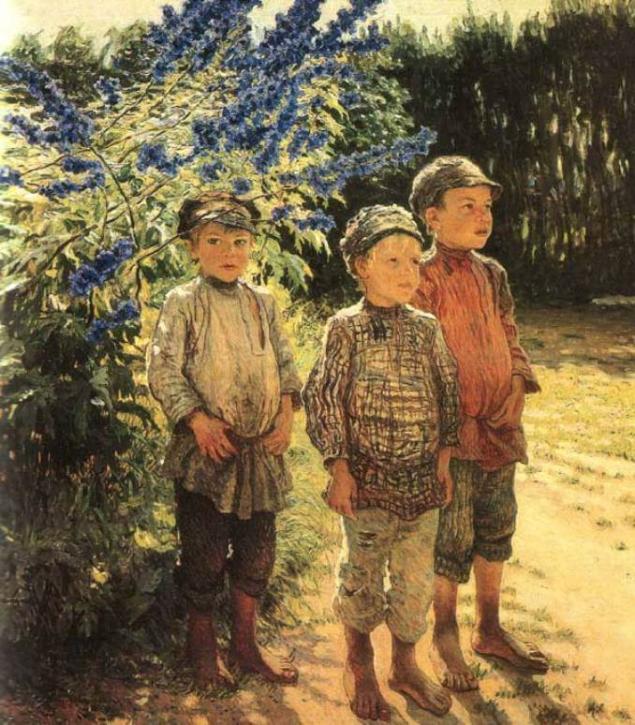
Among the commercial classes were also picking berries and extraction of pine nuts. Teenagers took an active part in the collective, which included several families, trips to the craft. In the process they became acquainted with nature, learn to better navigate the terrain, adopting the experience of construction of field camps. To 14-15 years the main field, the skills have been learned. Going in the spring to fish the father was afraid to leave the son of this age to earn one's living in the woods alone.
An important step in sotsiokonsalting formation of the teenager in the commercial areas had adult membership in fishing cooperatives, which included all the men of the village from teenagers to the elderly.
Men's fishing, less hunting enterprises, as well as seasonal work, craft professions, contributed to the preservation / revival of the traditions of men's organizations. One of them was on probation for admission to the gang of Teens 8-12 years, without which they could not become full members. A vivid example was to test adolescents on the Murmansk fisheries coast-dwellers: they were assigned impossible tasks, cheated, applying instead of a fish in sacks and tackles rocks, forcing themselves to earn their living, staged competitions between them, etc.
From that moment professional and life education of the teenager concentrated in the farm. Growing up, the boys moved into the category of Jung and coastal fishers who already had his share and contributed a significant share to the family budget. Adults treated them with respect and affectionately called the "breadwinners".
15 years teenager took over all business skills, was considered fit to all men's work and, if hired workers were paid an equal adult. He was considered the right hand of the father, replacing his absences and illnesses.
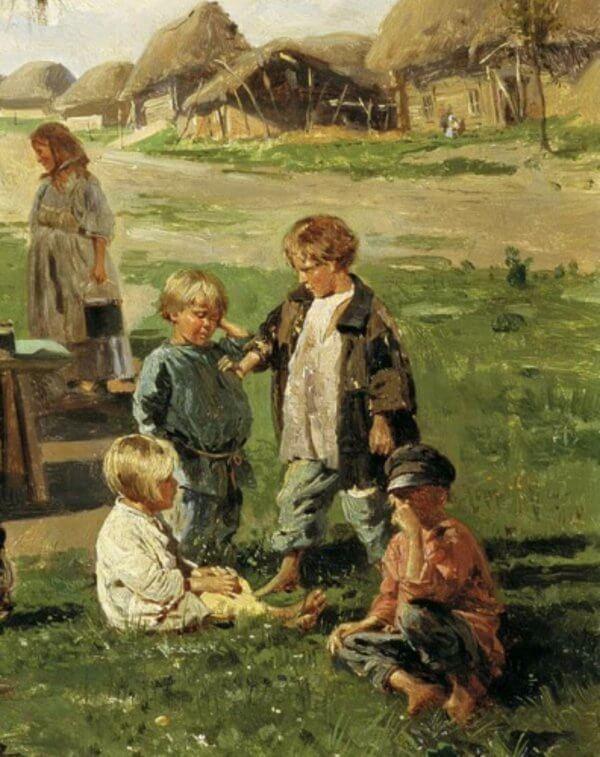
In the operational areas of adult sons took care of all the spring field work. While his father was in the field, the teenager their own ploughing and zaborniak station, and then went to the aid of the father. With earnings, a teenager partially spent it on himself, preparing age outfit for the festivities, without which he could not be considered as eligible bachelor.published
Also interesting: 3 IMPORTANT things to teach Your children
As fed infants in pre-revolutionary Russia
P. S. And remember, only by changing their consumption — together we change the world! ©
Source: vk.com/vselo?w=wall-21920914_8937
Attracting boys to work on the ground was one of the most important points in the transfer of skills necessary for independent living. Not owning them, the teenager could not become a full member of the village community. In the Russian tradition, the practice of farming was perceived as the Foundation of full male status.
Becoming the assistant of his father, the boy participated in all its works. In the manuring of land: dad brought manure and scattered it in large piles, the son dragged him across the field, and then during plowing saw to it that clods of earth and manure do not impede the work of the plow and not covered furrow.

From 11-13 years, the father taught the boy for ploughing. "Nedoluha" he rarely explained to the son how to plow, and it was not necessary, because he, following his father relentlessly, adopting all the necessary techniques. Father trusted his son to spend a couple of furrows or allowed to exercise with independent processing of the small area of arable land. The teenager mastered plowing usually 14-15 years — on the threshold of adulthood.
In the Russian village of the XIX — XX V. V. the accession of the boy labour in family life, the mastery of men's economic functions was accompanied onnecessary by bringing him to the care of the horses: and he asked them food, gave to drink in the summer drove to the river to drink. 5-6 years old child was trained to control the horse, sitting on horseback. 8-9 years, the boy learned to harness a horse, to manage it, sitting and standing in the cart. At this age he was sent to night — night summer grazing of the herds of the village horses.
In the Russian North and in Siberia, where fisheries (fishing, hunting, etc.) had in the circle of the economic concerns of vital importance, children with early childhood attracted to commercial pursuits.
First, in the game, and then watching his father and brothers, helping them to measure the forces, 8-9 years boy took over the basics of the fishery: was able to put in the middle lake loop on the ducks to shoot from a bow. In 10 years teenagers caught gophers, coring. Selling loot itinerant merchants, they received the first money they had to spend at its discretion. At this age, almost every boy in the Siberian village could make their own "face" for fishing and install them in the river. Pride was the first fish caught.

Among the commercial classes were also picking berries and extraction of pine nuts. Teenagers took an active part in the collective, which included several families, trips to the craft. In the process they became acquainted with nature, learn to better navigate the terrain, adopting the experience of construction of field camps. To 14-15 years the main field, the skills have been learned. Going in the spring to fish the father was afraid to leave the son of this age to earn one's living in the woods alone.
An important step in sotsiokonsalting formation of the teenager in the commercial areas had adult membership in fishing cooperatives, which included all the men of the village from teenagers to the elderly.
Men's fishing, less hunting enterprises, as well as seasonal work, craft professions, contributed to the preservation / revival of the traditions of men's organizations. One of them was on probation for admission to the gang of Teens 8-12 years, without which they could not become full members. A vivid example was to test adolescents on the Murmansk fisheries coast-dwellers: they were assigned impossible tasks, cheated, applying instead of a fish in sacks and tackles rocks, forcing themselves to earn their living, staged competitions between them, etc.
From that moment professional and life education of the teenager concentrated in the farm. Growing up, the boys moved into the category of Jung and coastal fishers who already had his share and contributed a significant share to the family budget. Adults treated them with respect and affectionately called the "breadwinners".
15 years teenager took over all business skills, was considered fit to all men's work and, if hired workers were paid an equal adult. He was considered the right hand of the father, replacing his absences and illnesses.

In the operational areas of adult sons took care of all the spring field work. While his father was in the field, the teenager their own ploughing and zaborniak station, and then went to the aid of the father. With earnings, a teenager partially spent it on himself, preparing age outfit for the festivities, without which he could not be considered as eligible bachelor.published
Also interesting: 3 IMPORTANT things to teach Your children
As fed infants in pre-revolutionary Russia
P. S. And remember, only by changing their consumption — together we change the world! ©
Source: vk.com/vselo?w=wall-21920914_8937
6 problems in the mouth, behind which lurk in other diseases
Reusable notebook Dobrobut notebooks, preserving forest











